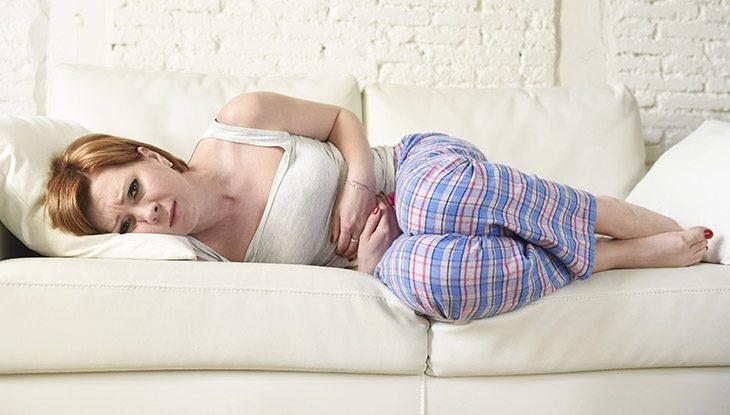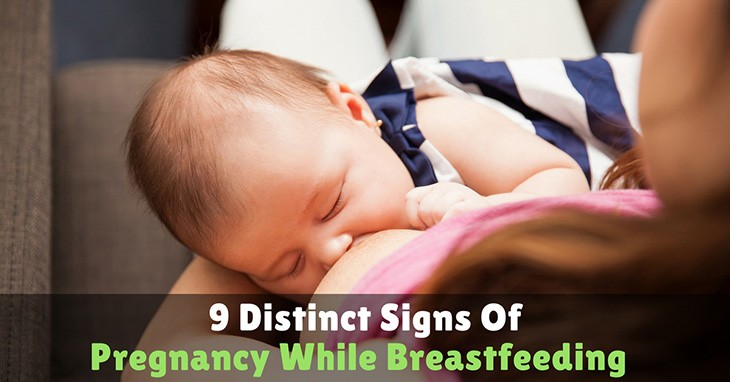9 Distinct Signs Of Pregnancy While Breastfeeding
Many women actually make use of breastfeeding as a natural method of contraception until they start weaning their babies. This method can be successful. However, in some cases, regular menstruation can start before weaning begins.
While it cannot be predicted when your menstrual cycle will return after delivering your baby, you can still avoid becoming pregnant by making use of contraception like condoms. In some cases, you can still become pregnant while breastfeeding. If this happens, there are distinct signs of pregnancy while breastfeeding that you will experience.
More...
Can Breastfeeding Affect Pregnancy?
The stimulation of the nipples during breastfeeding stimulates the production of the hormone prolactin, resulting in a negative consequence on the reproductive hormones.
When the body has high prolactin levels, the less fertile the woman is. Basically, this hormone restricts ovulation and put off menstrual flow. Some women actually stay infertile for about 16 months through increasing the prolactin levels in their body.
While breastfeeding may prevent pregnancy, this is still not a 100 percent effective contraceptive method.
It is still possible for women to become pregnant once their regular menstrual flow resumes. In some cases, it is also possible for women to ovulate without experiencing any menstrual flow. In both cases, a woman can still get pregnant.
Signs And Symptoms Of Pregnancy While Breastfeeding
Becoming pregnant while you are nursing your newborn baby is possible, as breastfeeding is not 100 percent effective when used as a contraceptive method. While you may not be ready for another addition to your family, this is something that you should consider a blessing.
There are various signs that can determine that you have conceived even while you are breastfeeding. Knowing these signs can prepare you for the possibility that you have become pregnant again. Here are some of the signs that you should take note of.
#1 Breast Tenderness And Pain

Breast tenderness and soreness are one of the first symptoms of pregnancy that a breastfeeding woman may experience.
When you become pregnant, your nipples become irritated and sore while nursing. This can trigger pain and discomfort for many nursing mothers. For some, this can result to early weaning of babies from breastfeeding.
As your breast will begin to start feeling heavy, fuller and painful, it is ideal to start wearing a nursing bra which supports full breasts. You can still use this kind of bra after giving and it should give some form of relief throughout the pregnancy.
#2 Decreased Milk Production
Decreasing milk supply could also be a sign of pregnancy while breastfeeding.
The content, as well as the taste of breast milk, will change throughout the course of the pregnancy. When this happens, your baby will become hungry more frequently and will try to initiate more feedings.
When your milk production decreases, your baby has the tendency to independently wean from breastfeeding on his or her own. Supplementing with formula may be a viable option for those nursing mothers who experience decrease milk production while pregnant.
It is also important to take note that pregnancy may not be the only reason why milk production decreases. Other causes of decreased milk production include stress, illness, caffeine and alcohol consumption, and certain medications.
If you are not sure what is causing the decrease milk supply, you should seek to consult with your health care provider. Your doctor can conduct further assessment and testing to confirm whether your pregnant or determine whatever is causing it.
#3 Nausea And Vomiting Or Morning Sickness

Morning sickness is considered one of the most notable signs of pregnancy even when you are breastfeeding. This symptom usually occurs during the first trimester of the pregnancy and goes away when you enter the second trimester of the pregnancy.
There are certain foods and smell that can trigger nausea and vomiting. However, these triggers can vary from one pregnant woman to another.
If you did not have your period yet while breastfeeding and you begin to feel sick during the mornings, it is likely that you have conceived.
To relieve morning sickness, you can try smelling citrusy scents. Also, it is important that you eat more nutritious foods even when you are having morning sickness. You should consider eating more proteins and less carbohydrate-rich foods for this stage of the pregnancy.
It is also ideal to steer clear of those foods and smells that are causing you to throw up. In most cases, morning sickness is temporary and should subside when you reach the second trimester of the pregnancy.
Nausea and vomiting may be caused by other conditions like viral infection, food poisoning, and other illnesses. It is best to consult your health care provider first to determine if you are experiencing a pregnancy-related morning sickness or something else.
#4 Increased Feelings Of Fatigue

Breastfeeding can contribute to feelings of fatigue that a nursing mother experiences. If you add in pregnancy, feelings of fatigue will significantly increase.
Pregnant nursing mothers will notice that they need more daytime naps than the usual. Moreover, they will also experience an overall decrease in energy all throughout the day.
Other than the demands of breastfeeding and pregnancy, increase fatigability may be caused by stress, major life changes, problems and other health conditions.
To cope with fatigue during pregnancy, you can take try taking frequent naps to recharge and adhere to a nutritious and well-balanced dietary regimen. Eating more fruits and vegetables will also help boost a pregnant woman’s energy levels.
You should also make sure that you stay hydrated all the time. Dehydration can increase feelings of fatigue while you are pregnant and breastfeeding. You have to drink at least eight glasses of water every day.
#5 Implantation Bleeding Or Spotting
Implantation bleeding is characterized by spotting or slight bleeding that occurs when the embryo implants on the walls of the uterus. This usually happens between the sixth to tenth weeks of the pregnancy.
Implantation bleeding is one of the most distinct signs of pregnancy while breastfeeding. However, it is important to note that spotting may also occur without implantation, as menstrual cycles are unpredictable during breastfeeding.
The spotting can be heavy or moderate. However, if it is accompanied by other symptoms like pain, you should consider seeking consult with your health care provider. Your doctor can assess and help you out with clearing your doubts and adhering to an effective and proper intervention.
#6 Frequent Urination

When the fetus grows, the growing uterus will press against the bladder and will cause it to shrink. In such case, the bladder fills up rather quickly, resulting in more frequent trips to the bathroom to urinate.
Frequent urination, however, may also be caused by other conditions like urinary tract infection, diabetes, bladder dysfunction, and uterine enlargement that are not related to pregnancy. This may also be caused by medications like diuretics.
When you experience frequent urination, you should not hold your urine, as this may cause you to develop urinary tract infection.
#7 Cramping

Unfortunately, you can still experience cramping while pregnant. In fact, this is one of the signs of pregnancy even while you are breastfeeding.
Cramping is often described as a pulling sensation on one or perhaps both sides of the abdomen. Many women who experience cramping believe that they are going to have their menstrual period, but if the period does not occur, it could be that this is already a telltale sign that they are pregnant.
Cramping can happen due to the implantation. In most cases, some women may experience cramping along with implantation bleeding.
#8 Increase In Appetite Or Hunger Pangs

While some women may experience nausea and vomiting during the first trimester of the pregnancy, there are others who feel an increase in their appetite.
Your appetite increases because you are already feeding one baby through breastfeeding and you are also eating for another baby developing inside your womb. In this case, you will need more calories to keep up with the pregnancy and breastfeeding.
If you begin to notice that your appetite has increased and you do not seem to feel satiated, there is a good chance that you have conceived.
Conclusion
Becoming pregnant while you are breastfeeding is possible. Since this form of the contraceptive method is not 100 percent effective, you should consider using other contraceptive methods if you are not ready to become pregnant again.
However, if you do become pregnant, there are several signs that can confirm this. The different signs of pregnancy should give you a hint that you may have likely conceived. A positive pregnancy test should confirm this.
If you are experiencing the signs but you are not sure, you should consult your health care provider to confirm whether you are really pregnant or you are simply experiencing the signs due to other causes.


